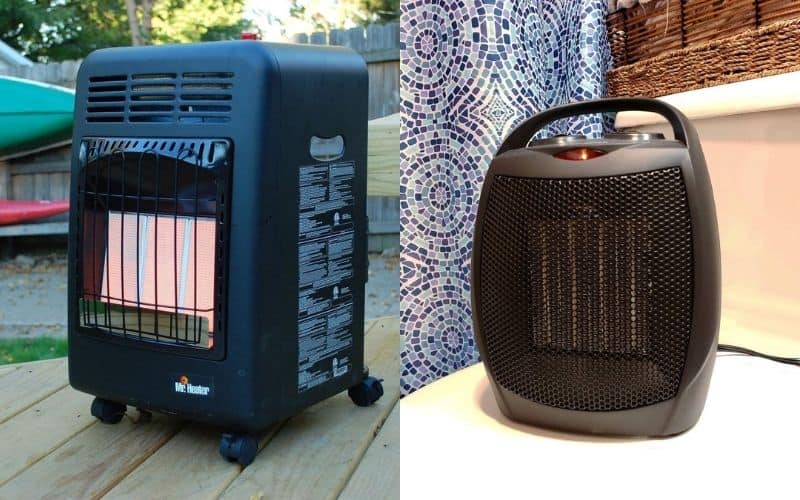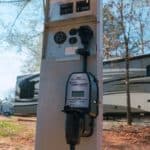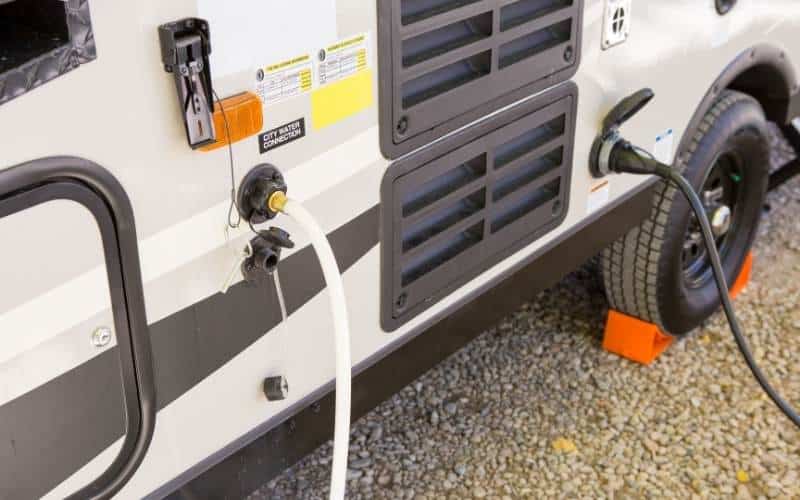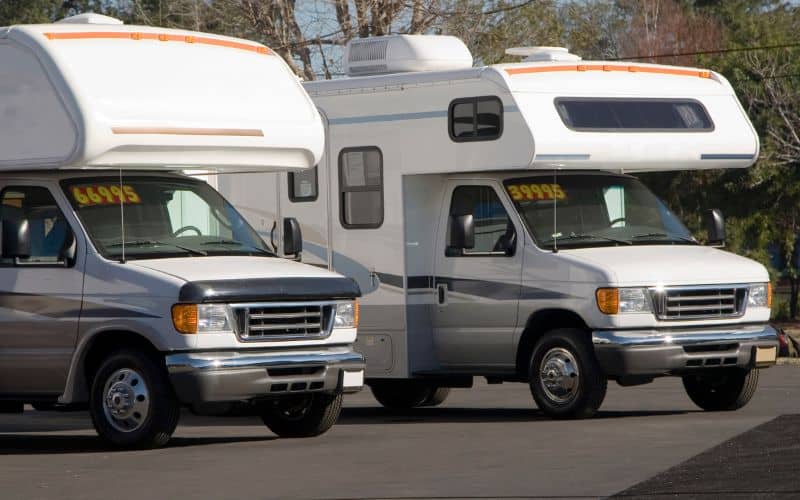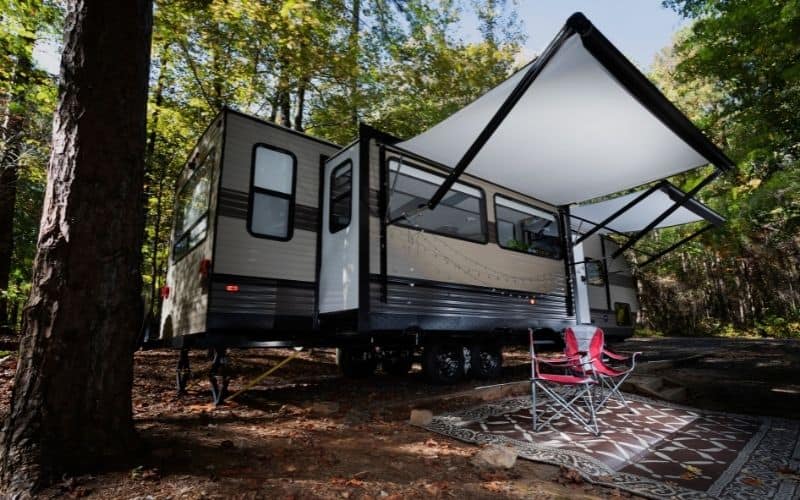Fall hunters who use their RV as their base camp and families who use their RV during all four seasons prioritize an RV with a good heater.
Though even a simple trip to the mountain, a summer cold front, or a night spent camping in the desert can all leave you worrying if you have the right heater in your RV to meet your needs.
If you are thinking about buying a new RV or upgrading an existing RV you might be wonder what is the right heater for your camper propane or electric?
A lot of RVs come with propane heaters installed in them or offered as an available upgrade.
Some of the larger travel trailers, fifth-wheels, and motorhomes have electric fireplaces installed in their primary living room or master bedroom to help take the chill out of the air.
Though they might not always have the rated BTU output to meet your specific needs.
To help you choose which is right for your RV a propane or electric heater, we decided to take a closer look at the pros and cons of both.
Understanding the type of heating device that is best for your RV means taking into account how you are most likely to use it.
How Does An RV Propane Heater Work?
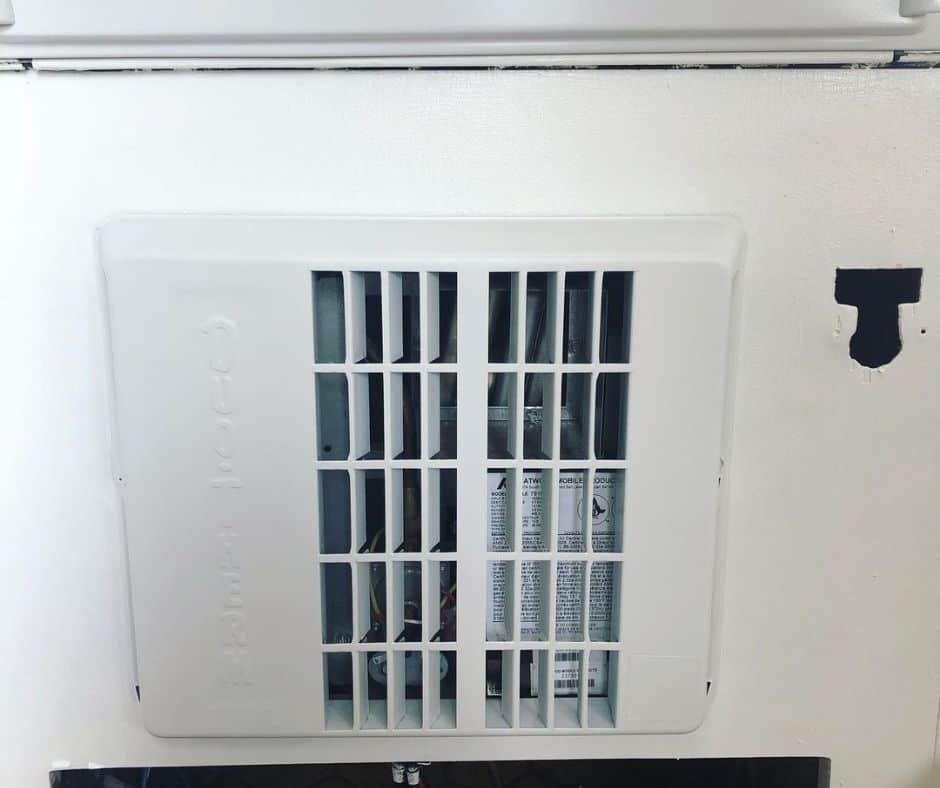
A lot of RVs come with a propane heater or furnace installed as part of the standard equipment.
They burn the fuel provided by your RV’s propane tanks to create heat.
Though they do tap into a little bit of the RVs house batteries to help with ignition and operating the thermostat.
If your RV has a ducted propane RV furnace then it might also need to draw electric current from the 12 Volt house batteries to run the forced air fans.
The nice thing about RV propane heat is that it is toasty warm. Especially when it’s diverted through a well-engineered ventilation system it spreads heat throughout the RV better than an electric heater where the warmth tends to be stronger near the electric fireplace or other electric heating devices.
A properly installed propane furnace will also vent any carbon monoxide while producing minimal moisture. This isn’t necessarily the case with a portable propane heater
Using Portable Propane Heaters In Your RV
Sometimes a portable propane heater can help augment the RV’s existing propane furnace.
Though there are some details to bear mind with this type of propane heater, as burning propane can produce carbon monoxide.
If you are going to use a Buddy Heater, Mr. Heater, or Sunflower propane heater, then you need to make sure you are providing proper ventilation.
It’s also a good idea to install a carbon monoxide detector near the ceiling as an early warning system.
If you are concerned about tapping them directly into your RV’s propane system, you might be able to connect a propane heater to a secondary tank.
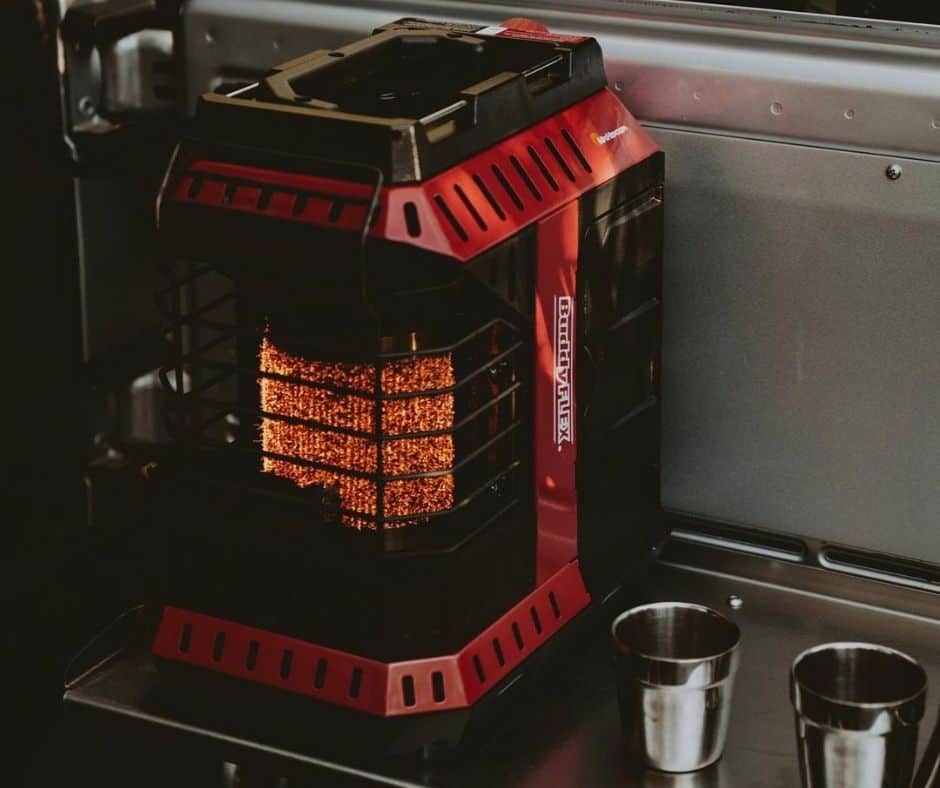
Just make sure you are taking into account the potential for interior carbon monoxide buildup and you are thoughtful about fire safety.
There is another minor concern with propane heaters in that they tend to also increase the ambient humidity in the RV’s interior.
Especially near the furnace or propane heater. In deep cold conditions, this can build up as frost and ice around windows and doors, which can affect the seals. In an extreme situation, it can potentially freeze your windows shut.
In prolonged severe cold, there is also a risk of an external propane tank freezing up as it starts to run low.
While rare, it tends to happen in the coldest hours of the night and can leave you waking up desperately cold and worried.
The Pros Of RV Propane Heaters
The Cons Of RV Propane Heaters
How Does An Electric RV Heater Work?
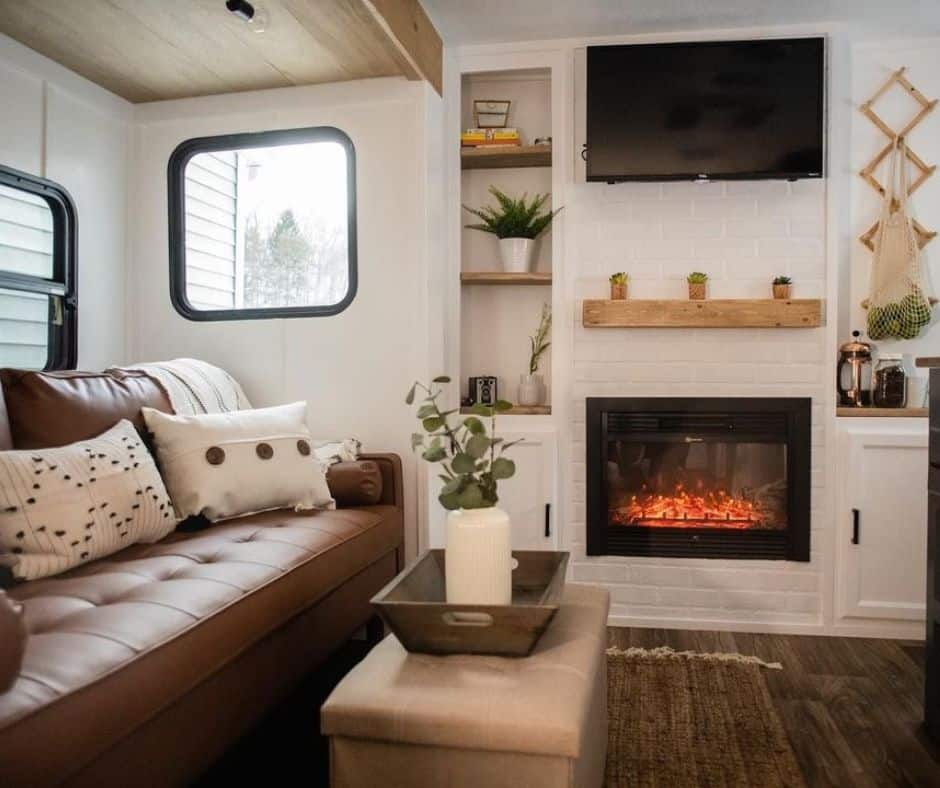
Some RVs come with electric fireplaces or in-wall electric heaters installed directly into the primary living areas or the master bedroom.
These devices are designed to help take the chill out of the air during a freak summer cold front or to help add extra warmth to key rooms in the RV, while you conserve propane by turning down the primary furnace at night.
Though some smaller RVs come with just electric heaters installed to help save space.
Electric RV heaters use a sophisticated version of resistor technology to generate heat. Current that is drawn from the house battery or RV park’s shore power passes through a special resistor system.
The impeded current creates heat. Then a small internal fan blows over the heating element to send that warmth out into the RVs interior.
Of course, when it’s connected to your RV’s house batteries, there is a very real concern of an electric heater stealing the current you would otherwise use for running lights and other electric appliances.
This is less of a concern if you plan to camp at an RV park with shore power service available.
Using a portable electric “Space” heater to heat your RV or augment the heat in a specific place like a master bedroom, there is some potential fire risk.
The longer you run the electric heater the more the resistance heating effect can start to travel through the primary power cord.
The concentrated heat can also melt or burn surrounding carpet drapes or other soft surfaces.
There are also some RV parks that ban the use of electric space heaters as part of their rental rules. This is due to the fire risk associated with them.
So, you might want to ask in advance if you plan to use an electric space heater to do something like warm the master bedroom.
The Pros Of Electric Heaters & Electric Fireplaces
The Cons Of Electric RV Heaters & Electric Fireplaces
Which Is Better For Heating RV Floors Propane Or Electric?
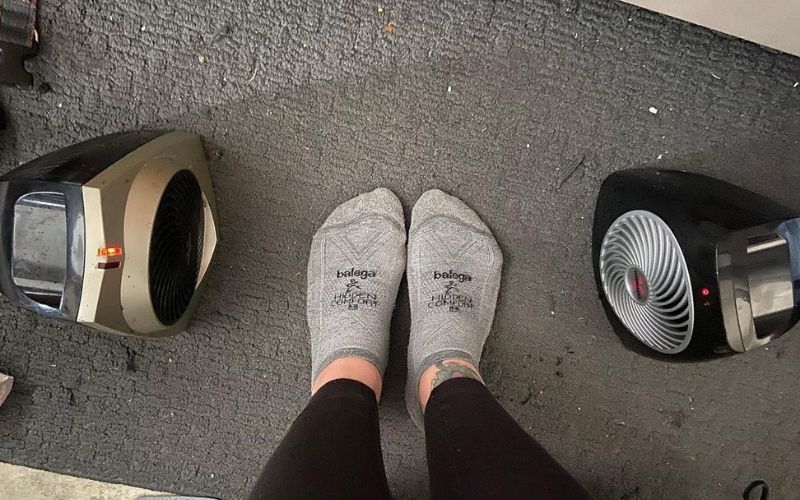
Floor heating technology has become so popular in homes that you are now seeing it showing up in RVs. Though these systems use propane and electricity in different ways.
RV Floor Propane Heating
These systems in an RV operate as part of the RV’s forced-air furnace ventilation system. Most of these RVs have a sealed and insulated underbelly.
This prevents heat loss. The forced air from the furnace warms the floor over time, which makes it comfortable enough to walk in stocking feet.
Though the system does need to run for several hours to really enjoy the effect.
Electric RV Floor Heating
These systems tap into residential floor heating technology, where low wattage heating elements gradually warm the floor over the course of 30 to 60 minutes.
They are more popular in bathrooms, RV kitchens, and living rooms where hard flooring is available.
Just like radiant and electric space heaters, these systems draw current from the house batteries or the RV park’s shore power connection.
Which Is Cheaper to Use: Propane Gas or Electricity for Your RV?
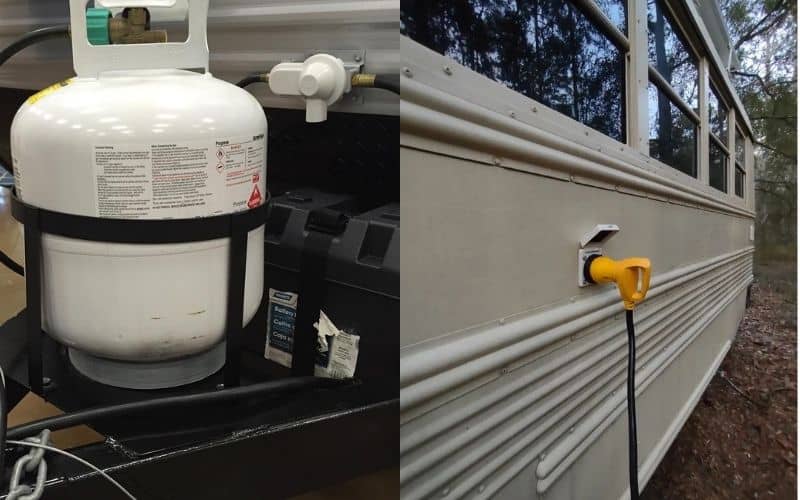
Propane tends to be more cost-effective than electricity when it comes to tapping into a consumer supply.
Especially if you are connected to a supply at your home, lake lot or you stay in your RV at a long-term rental property.
The only time that electricity is more cost-effective to heat your camper is if you are connected to a shore power supply at a campground or RV park that includes electricity access at a flat rate as part of your rental fee.
In this scenario, the electricity is virtually free, as it’s rolled into your rental price.
Using an electric fireplace or RV portable electric heater in a scenario like this can actually save you money and reduce the amount of propane you go through during your stay.
Electric vs Propane rV Heaters: Which One Is Better For Your RV ?
Propane furnaces and propane heaters are the best way to heat an RV. They tend to be the most convenient sources of RV heat.
At the same time, propane tends to cost about half as much to heat the same area. There are also fewer propane restrictions in RV parks compared to electric.
Choosing a model that is rated to provide 1,000 BTUs per hour, per linear foot of RV helps hedge your bets to ensure you have the heat you need.
Electric fireplaces and portable space heaters can then be used to help keep primary living areas warm while turning down the propane furnace in other parts of the RV.
Ultimately, electric heaters are meant more for taking the chill out of the area or for adding additional warmth to small living areas and bedrooms.
Though an electric fireplace might be perfect for times when you are connected to shore power and you need to take the chill out of the air during a freak summer cold front.
Frequently Asked Questions
What Are BTUs?
BTUs stand for “British Thermal Units” which is defined as the amount of heat required to raise the temperature of one pound of water by one degree Fahrenheit.
It is generally recognized as the standard measure for how heat is equivalent to energy. Most of the BTU furnace ratings you see in RVs are based on BTUs per hour.
In general, the higher the BTU rating is, the more heat the propane furnace or electric heater will put out.
The larger the interior area you need to heat, the higher the BTU rating you want in the heating device.
How Many BTUs Do I Need To Heat My RV?
The general rule of thumb when it comes to RV heaters is to target 1,000 BTUs per linear foot of RV.
In simple math, this means a 30,000 BTU furnace should be sufficient for heating a 30-foot trailer.
Though you might be able to get away with a lower BTU rating for your RV furnace if it has things like upgraded insulation, thermal windows, or special ductwork to optimize the heat distribution through the rig.
What Is An RV Heat Pump?
Heat pump systems were initially used as part of innovative RV air conditioning systems. Though they have evolved to be able to help add warmth without having to turn on your RV’s furnace.
Just bear in mind that the heating elements in these heat pump systems run off electricity.
They tend to consume more wattage than a house battery system is meant to supply, which means you will need a shore power connection or a generator to support them.
This makes it a more effective way of heating the floor. It is also the sort of thing that you really only find in newer, luxury RVs.
How Do I Deal With Heat Pooling At The Ceiling?
Heat naturally rises. A lot of people trying to heat an RV will find that heat tends to pool at the ceiling.
You end up with a cold floor and a furnace that runs more often. Heat pooling at the ceiling is even more of an issue when you are using electric heaters in your RV, or the ducts for your propane forced air furnace don’t run through the floor.
Even something as simple as a portable 12 Volt tent fan placed at the ceiling and pointed down toward the floor will help mix the hot air produced by your propane furnace or electric heater.
This will go a long way toward helping your preferred heating system to run more efficiently.
Propane Has An Edge Over Electricity
RV heating technology has evolved to the point where propane and electric heating sources are more efficient than ever.
The type of cold weather camping you do the most will strongly influence which is better for your RV propane or electric heaters.
If you are only going to camp in the summer, then an RV with an electric fireplace in the main living room and perhaps an electric space heater in the master bedroom might be the best way to heat your RV.
Especially if you have a generator, or you tend to stay in campgrounds or RV parks with easy access to shore power.
If you want to extend your season to fall hunting and even winter camping, then you absolutely need a robust propane furnace.
Choosing one that is rated to produce 1,000 BTUs per linear foot of the RV ensures that you have enough to keep everyone warm and prevent waterlines from freezing.
You can then use electric fireplaces and portable electric space heaters to boost the warmth and extend the runtime on your propane supplies.

